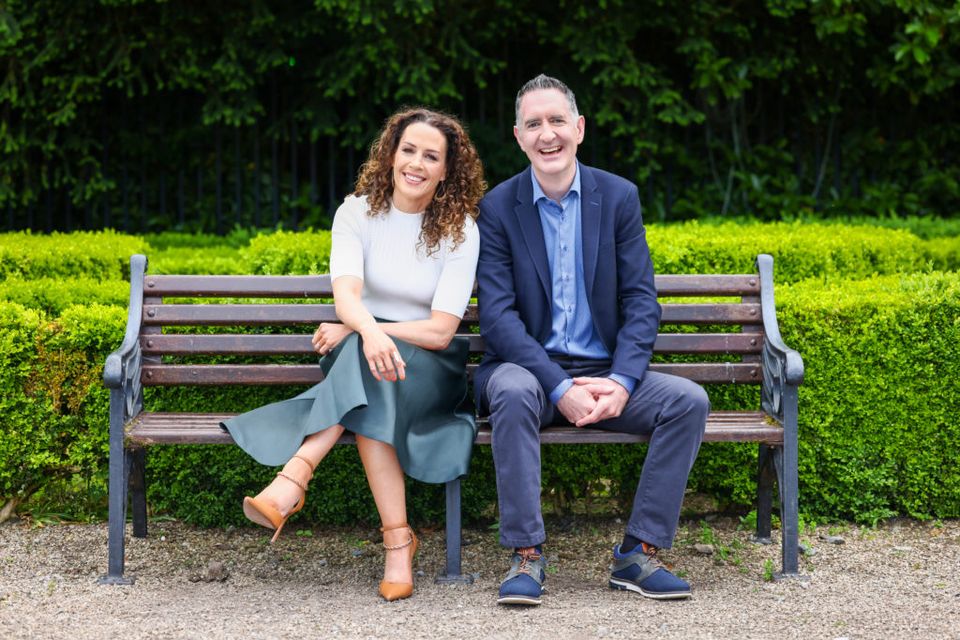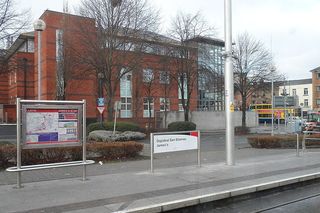Drivetime radio review: Mama mia! Words are changing
Drivetime is mostly about the serious side of life but there’s a bit of fun to be found there too, like a look at the Americanisation of Irish speech
Drivetime's Sarah McInerney and Cormac Ó hEadhra. Photo by Marc O'Sullivan
Last week, Sarah McInerney ruled herself out of contention for the Late Late Show. Telly’s loss is Radio 1’s gain, I guess: McInerney and Cormac Ó hEadhra have forged a fairly good partnership in the two-years-and-change they’ve been co-hosting Drivetime(Mon-Fri, 4.30pm).
Often a set-up like this will pair opposite personality types — good cop/bad cop or whatever. Here, we don’t really have that; McInerney and Ó hEadhra aren’t radically different in presentation style. Both are serious when needed, have a bit of a sense of humour when appropriate, are happy to ask awkward questions when required.
Both also, in my opinion, have that “current affairs broadcaster” habit of badgering the interviewee at times, going in too hard, being unreasonable to a degree; the sort of performance that feels like the presenter is demonstrating how “tough” they are to industry peers or news nerds on Twitter, rather than getting at the truth.
It doesn’t happen all the time, but it does happen. Personally, I don’t like it — too much of a performative, “look at how cleverly I skewer my opponent” university debate feel to it. That said, lots of people do like this style of interviewing, so fair enough.
In any case, this week’s show had a good range of topics, from oh-so-serious to, well, quite fun. In the former category, things such as Niall Collins, marriage pre-nups, Russian ships in Irish waters and how we should spend an expected — can this be right? — €65bn budget surplus.
Your humble correspondent particularly enjoyed bits on Eurovision, lateness, learning to swim as an adult and, especially, the rise of Americanisms in Ireland (nosed on a piece by Tanya Sweeney in this paper).
As Ó hEadhra put it in his intro, “Forget Ma or Mam, it seems all young people nowadays say Mom. As Americanisms become more common in our daily conversation, why are millennials and Gen Z sounding so different?”
I blame the internet, for this and pretty much everything else that’s bad in modern life. But what does an expert think? Dr Elaine Vaughan, lecturer in Applied Linguistics at the University of Limerick, said: “One theory is that we have so much exposure to different types of English, via media and mobility, that it’s changing the words we use and how we sound.”
It may not be as drastic as we think; Vaughan pointed out that people tend to notice things that irritate them: “‘Reaching out’ in emails doesn’t sound normal to me and I’m not mad about it — but to other people, it’s perfectly normal.”
Ó hEadhra aired one listener text which was so incendiary, you could practically hear the exclamation marks: “I’m fed up to the back-teeth of American pronunciation! Look up a dictionary for the correct pronunciations of words!!”
The show also spoke to one Diarmuid Furlong, possessor of a marvellous title: former president of the Irish branch of the Eurovision Fanclub. He was in the Canaries, savouring the atmosphere in ex-pat bars showing the event on TV — Liverpool, the venue for the grand final, being mind-bogglingly expensive.
“Enjoy it,” Ó hEadhra urged ahead of Ireland’s semi-final. Given that Wild Youth crashed out, that may have been over-optimistic.














